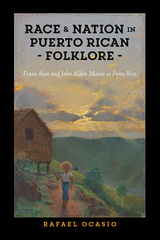Dream Nation
Puerto Rican Culture and the Fictions of Independence
Rutgers University Press
Over the past fifty years, Puerto Rican voters have roundly rejected any calls for national independence. Yet the rhetoric and iconography of independence have been defining features of Puerto Rican literature and culture. In the provocative new book Dream Nation, María Acosta Cruz investigates the roots and effects of this profound disconnect between cultural fantasy and political reality.
Bringing together texts from Puerto Rican literature, history, and popular culture, Dream Nation shows how imaginings of national independence have served many competing purposes. They have given authority to the island’s literary and artistic establishment but have also been a badge of countercultural cool. These ideas have been fueled both by nostalgia for an imagined past and by yearning for a better future. They have fostered local communities on the island, and still helped define Puerto Rican identity within U.S. Latino culture.
In clear, accessible prose, Acosta Cruz takes us on a journey from the 1898 annexation of Puerto Rico to the elections of 2012, stopping at many cultural touchstones along the way, from the canonical literature of the Generación del 30 to the rap music of Tego Calderón. Dream Nation thus serves both as a testament to how stories, symbols, and heroes of independence have inspired the Puerto Rican imagination and as an urgent warning about how this culture has become detached from the everyday concerns of the island’s people.
A volume in the American Literature Initiatives series
Bringing together texts from Puerto Rican literature, history, and popular culture, Dream Nation shows how imaginings of national independence have served many competing purposes. They have given authority to the island’s literary and artistic establishment but have also been a badge of countercultural cool. These ideas have been fueled both by nostalgia for an imagined past and by yearning for a better future. They have fostered local communities on the island, and still helped define Puerto Rican identity within U.S. Latino culture.
In clear, accessible prose, Acosta Cruz takes us on a journey from the 1898 annexation of Puerto Rico to the elections of 2012, stopping at many cultural touchstones along the way, from the canonical literature of the Generación del 30 to the rap music of Tego Calderón. Dream Nation thus serves both as a testament to how stories, symbols, and heroes of independence have inspired the Puerto Rican imagination and as an urgent warning about how this culture has become detached from the everyday concerns of the island’s people.
A volume in the American Literature Initiatives series
No other book weaves together so beautifully and completely the political, historical, social, economic, and cultural threads which make up the tapestry of Puerto Rican nationalism. Graceful, thought provoking, and deeply learned, Dream Nation will certainly have a lasting impact.
Gutsy and provocative, Dream Nation explores the 'semantics of desire' of colonial tropes of independence, challenging readers to probe and explicate the gaping abyss between yearning and fulfillment in identity politics.
An excellent book and an engrossing read. Highly recommended.
No other book weaves together so beautifully and completely the political, historical, social, economic, and cultural threads which make up the tapestry of Puerto Rican nationalism. Graceful, thought provoking, and deeply learned, Dream Nation will certainly have a lasting impact.
Gutsy and provocative, Dream Nation explores the 'semantics of desire' of colonial tropes of independence, challenging readers to probe and explicate the gaping abyss between yearning and fulfillment in identity politics.
An excellent book and an engrossing read. Highly recommended.
MARÍA ACOSTA CRUZ is an associate professor of Spanish at Clark University. Her work has appeared in the journals Hispanófila, Revista Iberoamericana, Revista de Estudios Hispánicos, and Chasqui Revista de Literatura Latinoamericana.
Preface
Acknowledgments
Introduction
1. Literary Tradition and the Canon of Independence
2. Breaking Tradition
3. From the Lush Land to the Traffic Jam
4. Dream History, Dream Nation
5. Dreaming in Spanglish
Conclusion
Biographical Appendix
Notes
Works Cited
Index












